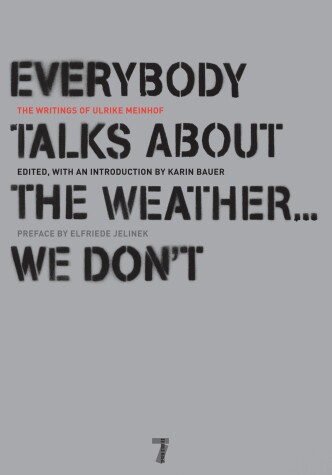
No other figure embodies revolutionary politics and radical chic quite like Ulrike Meinhof, who formed, with Andreas Baader and Gudrun Ensslin, the Red Army Faction (RAF), also known as the Baader–Meinhof Gang, notorious for its bombings and kidnappings of the wealthy in the 1970s. But in the years leading up to her leap into the fray, Meinhof was known throughout Europe as a respected journalist, who informed and entertained her loyal readers with monthly magazine columns.
What impels someone to abandon middle-class privilege for the sake of revolution? In the 1960s, Meinhof began to see the world in increasingly stark terms: the United States was emerging as an unstoppable superpower, massacring a tiny country overseas despite increasingly popular dissent at home; and Germany appeared to be run by former Nazis. Never before translated into English, Meinhof's writings show a woman increasingly engaged in the major political events and social currents of her time. In her introduction, Karin Bauer tells Meinhof's mesmerizing life story and her political coming-of-age; Nobel Prize–winning author Elfriede Jelinek provides a thoughtful reflection on Meinhof's tragic failure to be heard; and Meinhof ’s daughter—a relentless critic of her mother and of the Left—contributes an afterword that shows how Meinhof's ghost still haunts us today.
Stephen's Christmas present to me: "You're the one person I know who will appreciate this," he said, after covering Meinhof's work in Art History and wanting someone else to discuss it further. I read it in practically one sitting, a fascinating look at Meinhof's transformation from journalist to revolutionary to terrorist; becoming, in a sense, part of the cycle of inhumanity she had tried so futilely to fight. My father, stationed with US forces in Berlin in the late sixties and early seventies, had first-hand experience of Germany's Cold War politics of the time, the background against which Meinhof lived and died— which, in short, for me, made it all the more an intriguing piece of history.
Reading updates
-
Started reading
-
4 January, 2009:
Finished reading
-
4 January, 2009:
Reviewed
